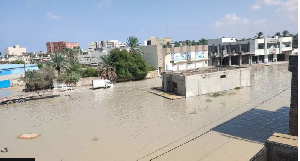At least 150 people have died after a powerful storm caused severe flooding in eastern Libya, an official has said.
Storm Daniel made landfall in the North African nation over the weekend, prompting authorities to declare a state of extreme emergency. Last week, it killed a dozen people in Europe.
Seven Libyan army personnel have gone missing during ongoing rescue efforts.
Officials in eastern Libya have imposed a curfew, while schools and shops have been ordered to close.
“At least 150 people were killed as a result of flooding and torrential rains left by storm Daniel in Derna, the Jabal al-Akhdar region and the suburbs of Al-Marj,” Mohamed Massoud, a spokesman for the Benghazi-based administration in Libya, told French news agency AFP.
Storm Daniel has affected the eastern cities of Benghazi and Sousse, as well as Derna and Al-Marj.
The western city of Misrata was also among those hit by the floods.
Storm Daniel: Honeymooners missing after holiday home swept
A really simple guide to climate change
Unverified videos of the storm have been circulating online, including a clip showing torrents of floodwater sweeping a man away. Other footage shows drivers trapped on their car roofs.
Alongside schools and shops, four major oil ports closed because of the storm.
The prime minister of the rival, internationally recognised government in the capital Tripoli, Abdulhamid Dbeiba, said on Sunday he had directed all state agencies to “immediately deal” with the damage and floods, while the United Nations in Libya said it was following the storm closely and would “provide urgent relief assistance in support of response efforts at local and national levels”.
Libya has been divided between two rival administrations since 2014, following the killing of long-time leader Muammar Gaddafi in 2011.
Last week, Storm Daniel struck Greece, Turkey and Bulgaria, killing more than a dozen people.
It is is expected to reach western Egypt on Monday.
Climate scientists have warned that global warming means more water evaporating during the summer, leading to more intense storms.
Source: bbc.com
 Home Of Ghana News Ghana News, Entertainment And More
Home Of Ghana News Ghana News, Entertainment And More





